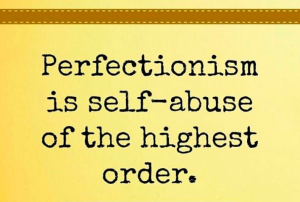Conquering Perfectionism
By Cindra Kamphoff, Ph.D.
 One of the key characteristics that separate great athletes and performers from the rest is a burning desire to be at their best. Great performers know they can be more than they already are. This desire motivates them to keep pushing beyond their comfort zone. They have big dreams and are continuously striving for those dreams.
One of the key characteristics that separate great athletes and performers from the rest is a burning desire to be at their best. Great performers know they can be more than they already are. This desire motivates them to keep pushing beyond their comfort zone. They have big dreams and are continuously striving for those dreams.
This desire for wanting more and being more, however, can result in negative tendencies that undermine performance. It can lead to an intense dissatisfaction with mistakes, beating oneself up if they don’t perform at their best or being extremely upset when they don’t win.
At the heart of this phenomenon is perfectionism. Research by my colleagues in sport psychology suggests that the best athletes in the world have perfectionistic tendencies. One study by Dan Gould and colleagues revealed that Olympians were moderately perfectionistic.
What is really important from this study is that they were perfectionistic in a good way. Meaning, they had high personal standards and organization, but had low concern over mistakes, parental expectations and criticism, and doubts over action.
Scholars suggest there are two types of perfectionism – adaptive and maladaptive – or positive and negative perfectionism. The adaptive form of perfectionism can provide the drive that leads to great achievement and striving for excellence. This good form can also result in outcomes that help performance like low negativity, less self-criticism, and high self-esteem.
The maladaptive form of perfectionism, on the other hand, can be damaging. This maladaptive form leads us to procrastinate, ruminate over past events of mistakes, and avoid competition or practice. It can cut at our confidence and shred our self-esteem. It can kill the fun that drew us to the sport or activity in the first place.
How do we keep perfectionism from sabotaging us, our dreams and consistently being at our best? Here are a few strategies to keep your perfectionism in check:
- One of the most important things to do is be compassionate with yourself. Being self-compassionate means being warm to yourself when you experience a shortcoming rather than ignoring it or criticizing yourself. Showing self-compassion also means recognizing that failure is part of being human.
- Watch when and how you are judging yourself. Awareness is key is keeping the perfectionism in check. And instead of judging yourself, react like your best friend would and say something to yourself or others like, “It’s no big deal – mistakes happen.”
- Focus on why you love to play or engage in the sport or activity. The maladaptive form of perfectionism can accompany an intense concern over what others think like parents, coaches, or friends and letting them down. Focusing on why you like or love what you do, can replace those worrisome thoughts.
It is good to have high expectations and strive for success. It keeps us going and energized. But perfection is unattainable. When we realize that no one is perfect and embrace our imperfections, we free ourselves of needless suffering. Instead of striving for perfection, work to see your imperfections not an inadequacies, but as being human. Simply human is the only way to live!
